Showing 231–240 of 262 results
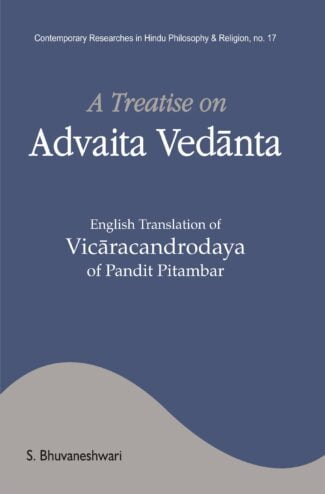
This English version of Vicaracandrodaya elucidates the basic concepts of Advaita Vedanta as a dialogue between a guru and his disciple. A true knowledge seeker who studies this text under a brahmanistha guru will get to know the secrete knowledge of Vedanta. Also, it is a ready reference to the basic concepts in Pancadasi of Vidyaranya and Vicarasagara of Niscaladasa.
A prakarana in old Hindi (one of the regional mixed dialects), Vicaracandrodaya elucidates the basic concepts of Advaita Vedanta in the form of questions and answers. Pandit Pitambar, the author of the text, presents this work as a dialogue between a guru and his disciple. This book is an English translation of Vicaracandrodaya, by S. Bhuvaneshwari. It is spread across 249 questions and their answers, and takes the reader into the essence of the entire Vedantashastra. It also has a Laghu-vedanta-kosha explaining the basic Vedantic terms and a chapter as index providing quick reference to the basic concepts of Advaita Vedanta.
The author enunciates that a true knowledge seeker who studies this text under a brahmanishtha guru will get to know the secrete knowledge of Vedanta. And this knowledge will dispel darkness from his mind as the rising moon dispels darkness from the world. However, he insists that it should be studied from a guru with shraddha as Vedanta cannot be grasped without the guidance of an enlightened teacher. Also, this book serves as a ready reference to the basic concepts as discussed in Pancadashi of Vidyaranya and Vicarasagara of Nishcaladasa.
This volume is both a guide to the beginners in Vedanta and a text for nididhyasana. It will benefit all the people who dwell in the domain of Vedanta.
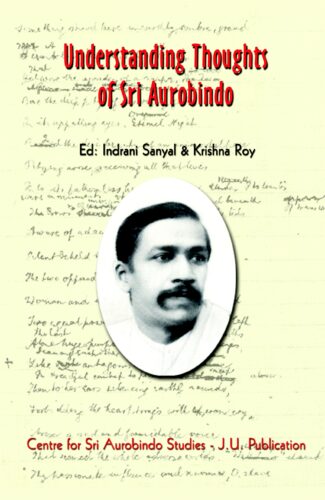
This volume explores various dimensions of thoughts of Sri Aurobindo (1872-1950), respected as a patriot, nationalist, social reformer, educationist, historian, poet, visionary, Yoga and a philosopher. He interprets Indian philosophical and spiritual tradition dating back to the Vedas and the Upanishads and emphasises National Education, in cultural and spiritual sense.
Understanding Thoughts of Sri Aurobindo explores various dimensions of thoughts of Sri Aurobindo (18721950) who is being respected as a patriot, nationalist, social reformer, educationist, historian, poet, visionary, Yogi and philosopher. Sri Aurobindo is the interpreter of the Indian philosophical and spiritual tradition and one of the ablest exponents of this tradition dating back to the Vedas and the Upanishads. Sri Aurobindo’s emphasis on National Education, more in the cultural and spiritual sense, may provide an answer to the intellectual, moral and spiritual crisis. This volume focuses upon the holistic, interdisciplinary approach to the thoughts of Sri Aurobindo, whose views and actions have left a lasting influence on the development of modern India. Referring to his three major works, The Life Divine, The Synthesis of Yoga and Savitri, as well as over thirty other works where he expounded his thoughts, the well-researched writings reveal the special features of his vision. They focus on his integral approach to the concept of evolution, his notion of integral philosophy and his concept of integral Yoga. The essays include an in-depth study of Sri Aurobindo’s concept of man, of state, and views regarding uplift of humanity. This book contains scholarly articles that seek to unravel the many dimensions of his thoughts. Students, researchers and persons interested in Sri Aurobindo Studies will be immensely benefited from this volume.

This work is an attempt to reveal the fundamentals of Carvaka philosophy the materialistic system of thought propounded by the ancient philosophers of India and its epistemological, metaphysical and ethical concerns. The Carvaka system is compared and contrasted with other systems of ancient philosophy.
Carvaka is the materialistic system of thought propounded by the ancient philosophers of India. The Carvaka system of philosophy has been much criticized and even ridiculed since the ancient times as the Carvakas have been dubbed as atheists and hedonists. This work is an attempt to reveal the fundamentals of Carvaka philosophy, and its epistemological, metaphysical and ethical concerns. Beginning with the origin and development of Indian materialism, it addresses the controversial and disputed issues regarding Carvaka philosophy on the basis of a profound study of the original sources on the subject and by referring to modern researches on it. It highlights the contributions of the Carvakas in the furtherance of moral and philosophical thoughts and their uniqueness in many respects, such as the Carvaka School being the only one among ancient Indian philosophical schools to accept only one pramana — perception. The Carvaka system is compared and contrasted with other systems of ancient Indian philosophy for the purpose. The book is praiseworthy in its attempt to present its findings in a logical manner.
The book will interest scholars and students of ancient Indian philosophy as well as general readers who are keen to understand ancient Indian philosophy.
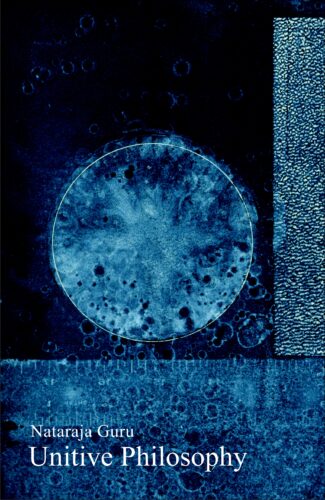
It is a uniquely rewarding book that will open up vast uncharted regions for exploration, especially for the serious thinker unsatisfied by the modern pop philosophy. A meaningful philosophy must have an absolute idea implicit in it and this book investigates several prominent strains of philosophy, to identify the absolute element.
Nataraja Guru single-handedly revolutionized philosophical thought in the mid-twentieth century. At a time when science had unwittingly followed Marxism into a materialist desert, he never relinquished his insight into what had been omitted. Now that scientists and philosophers everywhere are pausing in perplexity, having bumped up against the limits of their partial outlook, the Gurus works offer to reintroduce the wisdom that can bring the desert back to life. Stung by the horrors of the Inquisition, western science turned its back on metaphysics for hundreds of years. The extended effort to include as much as possible of the universe under the aegis of physical reality was an interesting experiment, but it has about played itself out. Ideas, memories, emotions and time, among other major categories, are metaphysical entities that have transcended every effort at being reduced to material existence. Matter itself is seen to be brimming with energy as soon as you look beneath the surface. A counterbalancing backlash has occurred recently in which religious and other metaphysical ideas, no matter how divorced from reality, are being embraced as a welcome escape from uncompromising materialism. For a sensible philosophy free of prejudice, which can open the road to further progress in human thought, a balance must be struck between physics and metaphysics. Each must support and verify the other. Nataraja Guru clearly establishes the basis for such an advance in this work, presenting an overarching scheme to integrate all aspects of reality under one roof. Any meaningful philosophy must have some version of an absolute idea or value implicit in it. After presenting his own absolute system Nataraja Guru investigates several prominent strains of philosophy, including the rationalist and the materialist, to identify the absolute element hidden within each of them. Totalitarianism and absolutism are shown to be totally antithetical, the former being highly exclusionary while the latter embraces every possibility. Dialectic thinking is at the heart of the Gurus philosophy, leading to an absolute vision that incorporates all parts within the whole. For the serious thinker unsatisfied by modern pop philosophy, Unitive Philosophy is a uniquely rewarding book that will open up vast uncharted regions for exploration.

The book presents the notion of unity in diversity in the context of globalization and multiculturalism. The concepts of unity and diversity have been contested in classical and modern theories. These theories give rise to the concept of diversity but jointly somehow they emerge as unity in diversity.
The book presents the notion of unity in diversity in the context of globalization and multiculturalism. Philosophically speaking, the concepts of unity and diversity have been contested in classical and modern theories; for instance, Plato’s idea of harmony and goodness, Aristotle’s phronesis or practical wisdom (teleology), Kant’s categorical imperative (deontology), and Mill’s utilitarianism (consequentialism) on the one hand and purusarthas divided into abhyudaya and nihsreyas, etc. on the other. These theories give rise to the concept of diversity but jointly somehow they emerge as unity in diversity.
In the era of globalization and multiculturalism, teleology, deontology, consequentialism and so on have been described, critiqued and even appreciated and appropriated from pluralistic perspective. With globalization and multiculturalism, human life is affected not only insofar as market is concerned, but also the ethnical, cultural and linguistic identities are equally affected. However, unlike globalization, multiculturalism endorses the role of the State in protecting and safeguarding the rights of diverse cultural groups, values and practices, marriage and settlements, property and inheritance, etc. so that members of each cultural community should become the valid participants in the civil and democratic life in the globalized world.
The perspectives of, and the conflict between individual needs and rights, and group needs and rights, have been conceptualized under liberalism and communitarianism. It is proposed to be achieved by developing cultural transformations in the era of globalization, thus creating reasonable exclusion on broader values. The effort is to allow these values to inform and reinforce each other for the possible foundations of multiculturalism, specially cosmopolitanism in the globalized world.
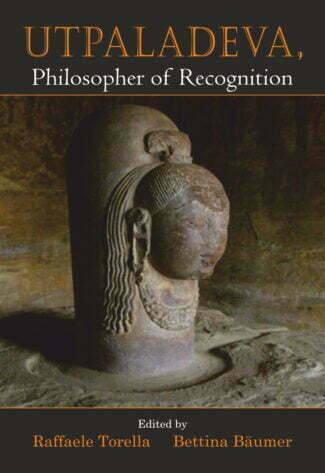
This volume presents the multifarious aspects of Utpaladeva, not only an outstanding metaphysician and epistemologist, engaged in a strenuous critical dialogue above all with the Buddhist logicians, but also one of the most extraordinary mystical poets of India. For the first time his contribution to poetics and aesthetics has been duly highlighted.
The book, which partly derives from the papers offered at the first International Seminar on Utpaladeva (IIAS, Shimla 2013), is the first ever attempt at presenting a comprehensive portrait of one of the most important philosophers of premodern India, so far mainly taken into account as a mere predecessor of the great Abhinavagupta. Recent studies by R. Torella and others have shown the central importance of Utpaladeva in the elaboration of the Pratyabhijna philosophy, and reduced the role of Abhinavagupta to that of his brilliant commentator.
The contributors to the present volume have shown the multifarious aspects of Utpaladeva, not only an outstanding metaphysician and epistemologist, engaged in a strenuous critical dialogue above all with the Buddhist logicians, but also one of the most extraordinary mystical poets of India. For the first time his contribution to poetics and aesthetics has been duly highlighted.
The book contains two appendices with the critical edition and translation by R. Torella of fragments from Utpaladevas long commentary (Vivriti) on his Ishvarapratyabhijna-karika and Vritti, one of the most important works of Indian philosophy as a whole, so far deemed to be totally lost.
This book should generate great interest among scholars of Sanskrit and philosophy for its uniqueness and should serve the curiosity of each and every scholarly reader of Kashmir Shaivism.
Vada, meaning debates, dialogues, discussions, was the quintessential of Indian spirit, enabling and promoting the growth of different philosophical and knowledge systems of India. It percolated deep into our mindset and enriched the moral, ethical, religious and sociocultural edifice of anything that was essentially Indian in nature. As continuation of Anvikshiki from the bc era, vada helped thrive Indian traditional knowledge systems. It subsists on diversity and its tradition envisages pluralism.
Most of our Sanskrit works, covering a wide gamut of knowledge systems, are structured in the techniques of debate. This reality applies not only to the philosophical writings, but to Indian medical systems (Ayurveda), Arthashastra of Kautilya and Kamasutra of Vatsyayana as well. Even great epics like Ramayana and Mahabharata are no exceptions.
Vada culture involved verbal duals, attacks and even violence of speech, and all major religious systems — old or modern — were parties to it. This book also elucidates how vata was vital and critical for the growth of our socio-political fabrics. It shows how some of the major conflicts in philosophical systems were centred around karma, jnana, choice between violence and non-violence, pravritti and nivritti. It also presents the manifestations of vada on a vast canvas during the nineteenth and twentieth centuries. Modern spiritual and religious gurus like Ramana Maharshi, J. Krishnamurti and Vinoba Bhave were men of dialogues. Our scholars have applied the varied techniques of vada against the philosophical and scientific systems of the West to prove them correct.
This collector’s issue should enthrall a wide audience of philosophers, scholars and believers in Indian knowledge systems.
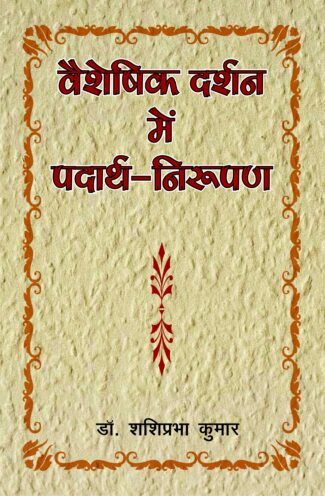
The present work is an encyclopaedic and authentic source for the study of Vaisesika, an important system of Indian philosophy. A comprehensive volume on the exposition of categories is worth obtaining by every library and each serious student of Indian thought.
Vaisheshika Darshana mein Padartha Nirupana (Exposition of Categories in Vaisheshika Philosophy) is an encyclopaedic work dealing with the metaphysics of Vaisheshika system of Indian Philosophy. This work takes up an extensive study of the categories of Vaisheshika and deeply analyses each one of them in well-structured manner. This is the most comprehensive book in Hindi which brings out the important contribution of Vaisheshika philosophy in an authentic way. So far, no other work has presented all the aspects of Vaisheshika as a central theme with the detailed analysis of its subsidiary principles in such an inclusive style.
This volume discusses the development of thought in Vaisheshika as well as the historical chronology of its scholars. It specially highlights the views of medieval thinkers of the Vaisheshika system who had hither to been ignored. The first edition of the present work was published from Publications Division, University of Delhi in 1992 and the second edition is now published through the scheme ßRepublication of Unavailable and Rare Textsû of the Rashtriya Sanskrit Sansthan, New Delhi.
This work is an invaluable for the in-depth study of Vaisheshika philosophy and is worth to be obtained by every library and is a wealth of information for all the students of Indian philosophy.
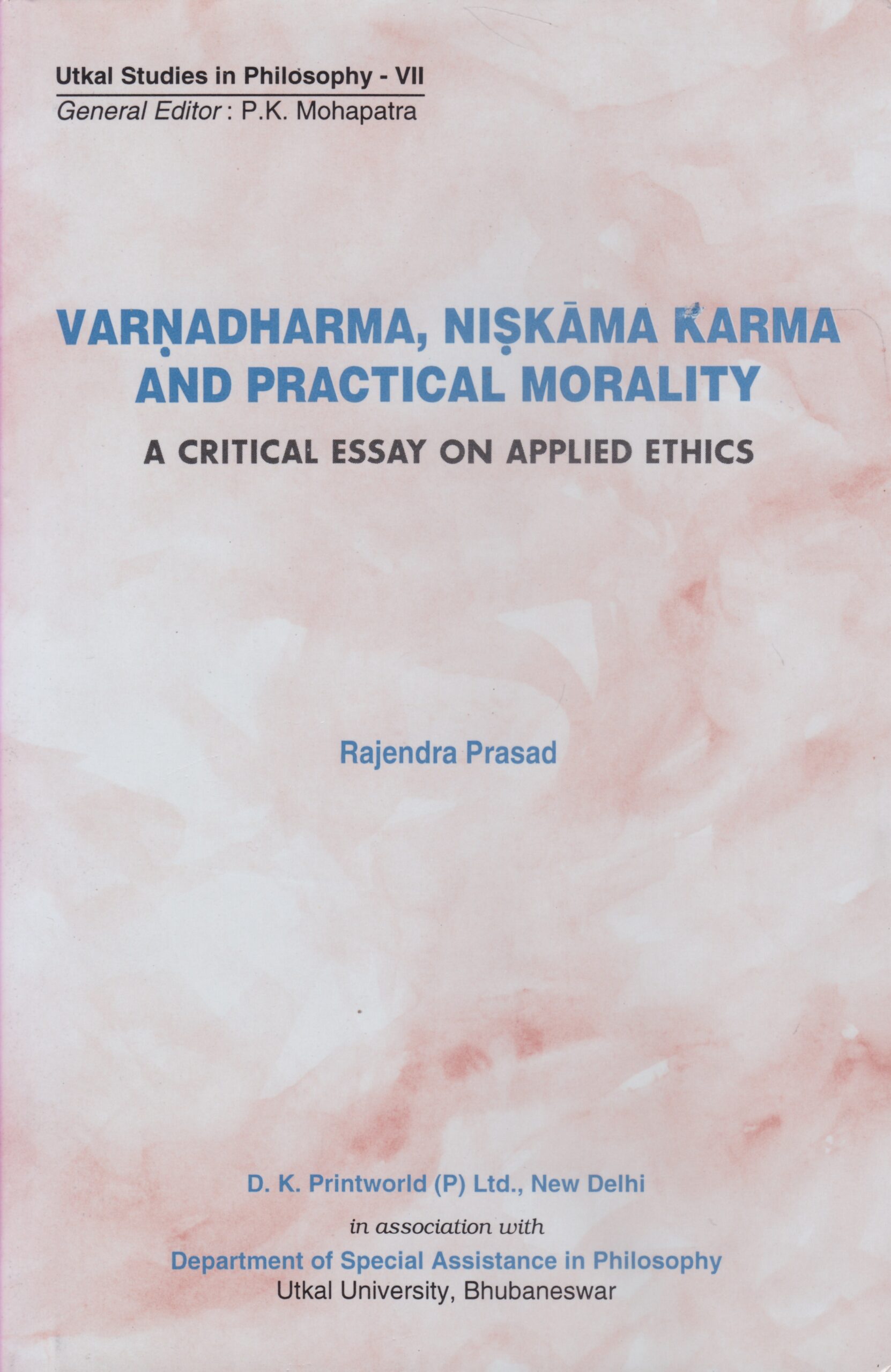
This work analyses some basic concepts of Indian ethics. It shows that a Varnadharma cannot be both natural and obligatory, the prescription of acting desirelessly makes any desireless action justified, the jivan-mukti concept is inapplicable, etc.
This book provides a bold, original and ciritical analysis of some basic concepts of Indian ethics, lifting them up from their regional roots to a general philosophical level, along with illuminatingly creative analysis of some practical issues of moral living. Professor Prasad shows, on logical grounds that a varnadharma cannot be both natural and obligatory, the prescription of acting desirelessly makes any desireless action justified, acting desirelessly itself cannot be a duty, the concept of jivanmukti is inapplicable, etc. In respect of ethical practice, he argues, with fair amount of rigour and originality, for moral anger and forgiveness as a conditional virtue, basing secularism on the primacy of the ethical, and preferring a morally good professional to one who is good as a professional or as a person. His plea for legitimacy of profit in business and non-hyperactivism in applying ethics throws useful light on business ethics. His down-to-the-earth approach makes the book a work on applied ethics and his conceptual openness makes it one on the basics. Its simple style makes it useful not only for students and teachers of philosophy but also for general readers with interest in Indian philosophy and culture.
Vedanta for the Western World is a collection of sixty-eight articles appeared in a magazine having the same title during 1938-45 by eminent scholars of international repute such as Aldous Huxley, Allan Hunter, Gerald Heard and Swami Prabhavananda reflecting on the varied aspects and universal reflections of Vedanta, with an Introduction by Christopher Isherwood. Vedanta, the Vedic philosophy per se, and not time-specific, focuses on three fundamental propositions that man’s real nature is divine; aim of human life is to realize this divine nature; and all religions are essentially in agreement as far as this divine concept is concerned. The essays featured in this volume imbibe and exude the same philosophy being best suited to the understanding of new generation audience, especially the one that belongs to the Western world. This unique volume stands out in its genera of works due to a wide gamut of topics featured in it under the umbrella banner Vedanta. It enables every student of Vedanta know the essence of the Vedic philosophies from the perspectives of both Indian and Western scholars and men of merit.